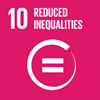How much do development programmes contribute to the internationally agreed Sustainable Development Goal to reduce inequalities by 2030? This project makes a vital contribution to monitoring progress towards SDG10 specifically, by assessing the impact of four development programmes implemented in Global South countries.
High levels of inequality within countries, currently all to common, are well-known to offend notions of social justice, increase social and political instability, and reduce prospects for national development and economic progress. It is therefore critical to assess how, and the extent to which, projects and programmes supported by development agencies contribute to the goal of reducing within-country inequalities.
This project builds on and expands a previous project, in which a mix of analytical tools were used to assess the distributional impacts of three development cooperation projects: in Tunisia, Cameroon, and Colombia. It assesses the potential distributional impacts of development programmes by focusing on whether programmes’ beneficiaries belong to the bottom 40% of the wealth distribution, through a mix of analytical tools.
The project builds and expands a mix of analytical tools used to assess distributional impacts of four development cooperation projects. These tools include: i) a scoreboard that assesses whether inequality reduction is a central objective of development programmes; ii) the EquityTool, which helps assess the position of beneficiaries within the wealth distribution, and iii) the Commitment for EquityTool, which helps estimate the distributional impact of general or sectoral budget support.
The tools will be used to assess selected development cooperation projects implemented in Benin, Djibouti-Ethiopia, Uganda, and Viet Nam. The project will further test the validity of the methodology with respect to income and other forms of inequalities, to align it more closely with current practice in the French Development Agency (AFD) and the European Union.
Key questions
- How well do development programmes contribute to reductions in within-country inequalities?
- What steps need to be taken to improve the impact of future development programmes on reducing within-country inequalities?
- Can the programme assessment tools be expanded to other types of inequalities?
- For which of the SDG10 sub-indicators can the tools be used to track the contributions to progress on the UN Agenda 2030 made through development cooperation programmes?
Watch this space!
The project centrally addresses SDG 10: Reduced Inequalities, especially how development cooperation can contribute to progress.

 Join the network
Join the network